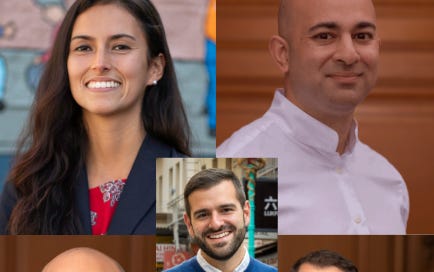So you’ve decided you want to hold political office in the great American City of San Francisco. Perhaps you’re attracted by the $160,000 salary. Sure, that’s significantly less than what many managers and department directors within the city make, let alone those in the private sector. But you gotta start somewhere, right? Or maybe you plan to use it as a springboard for a run for an even higher office, as has been done by Gavin Newsom, Kamala Harris, Diane Feinstein, Quentin Kopp, and Leland Yee. Or maybe you’re just a huge busybody who wants to micromanage everything going on in the city such that nothing can ever change without your say-so.
Whatever the case, if you want that job you’re probably going to have to win an election, unless you expect a vacancy to open up that you can get appointed to. Assuming you’re taking the electoral route, an obvious question arises. “How do I win an election in San Francisco?”
Well if you were some sort of nerd, you might think that the answer to that question is some multifaceted combination of various factors, many of which may be outside the control of individual candidates and may in fact be the product of what is effectively random chance.
But if those “One weird trick” ads that infest the internet are anything to go by, there’s always some simple solution to complex problems, such as weight loss, personal finances, or impotence, that somehow no one except sketchy looking pop-up ad providers know about.
Let’s see if there really is “One weird trick” to winning elected office in San Francisco.
Money
Per Liza Minelli, “money makes the world go round.” In political campaigns, having access to a large pool of funds is definitely useful for a lot of things.
Lots of funds means you can have lots of mailers sent to prospective voters to help build your profile and cultivate name recognition, while attacking your opponents. It can also help pay for consultants, polling, and campaign software, all of which helps you build a campaign strategy as well as understand your strengths and weaknesses as a candidate.
It might stand to reason that the candidate with the most money on hand wins the election. The recent example of Daniel Lurie dropping more than $15,000,000 on his winning mayoral bid seems to support that notion. But as in the case of the 2024 Board of Supervisors election, this doesn’t always hold, as in the case of Michael Lai and Dean Preston. Looking even further back in time, we can see even more dramatic examples of moneyed candidates failing to catch on. In 2018 Nick Josefowitz raised more than a million dollars in the District 2 supervisors race, only to lose by 4 points to Catherine Stefani, who had less than half that amount of money at her disposal.
This isn’t to say that money is irrelevant. You do need it to pay for the aforementioned ads and strategy. You can’t run a campaign on a shoestring budget. There is some minimum amount of money that’s needed in order to run a winning campaign. In the case of competitive supervisor races, that amount seems to be somewhere in the range of $300,000-$400,000.
Endorsements
So perhaps money can’t buy an election. What about endorsements? In an increasingly interconnected world where everyone is arguing with people around the world about the latest outrage in Washington, local politics can seem insignificant by comparison. It can even feel kind of distant, when there’s a nearly endless firehose of stories and opinions about Donald Trump accessible from your phone, while stories about city government require you to seek out specific local publications and blogs with far fewer eyes on them than they deserve.
In this sort of context, your average voter may fall back on relying on the recommendations of trusted sources to figure out how they’re going to vote in municipal elections. After all, if you don’t know what Measure W does or who the best candidate for city dogcatcher is, you’re more likely to trust the opinion of Uncle Bob or the local paper, who have read the texts of all the local measures and talked to all the candidates.
Well, who should you court for their endorsements to maximize your chances of winning? Prominent elected officials with high name recognition are a good start. Even better if they’re popular, or at least popular by politician standards. This was the approach taken by Connie Chan, whose 2024 reelection campaign was arguably saved by an endorsement from Nancy Pelosi, which Chan mailers touted prominently in the waning months of the campaign. On the other hand, Dean Preston received the same endorsement and went on to lose his re-election bid by six points.
Alternatively, high profile civic institutions’ endorsements might be valuable when trying to capture the votes of people who are not privy to the daily goings-on in local politics. In the case of San Francisco, this means the endorsement of the San Francisco Democratic Party. Since every candidate with a shot at winning in the city is a Democrat and a supermajority of registered voters are Democrats or Democrats-in-all-but-name1, the endorsement of the city party can be a valuable difference maker for voters who want to vote for a Democrat, but aren’t sure which of the 2-5 Democrats on the ballot are the “true” Democratic candidate. That line of reasoning was part of why there was so much effort put into the March 2024 election for the SF Democratic County Central Committee, the body that decides which candidates receive the city party’s official endorsement. Yet in spite of how coveted the party’s endorsement is, it’s not a clincher in terms of winning elections. In 2024 alone, at least 6 candidates managed to win election in spite of the SF Democratic Party endorsing one of their opponents, most notably among them being now-Mayor Daniel Lurie, as well as candidates in lower-profile races such as BART Board of Directors, Board of Education, and City College Board of Trustees. The party’s endorsement in past elections has been closer aligned with the eventual set of winners. But there have been some major historical exceptions as well, such as the 2019 District Attorney’s race.
Having the endorsement of the San Francisco Democratic Party seems to help, but it’s not going to clinch the election for you. So how about the city’s paper of record, the San Francisco Chronicle? With over 6 million monthly readers, its endorsement may be the one seen by the greatest number of San Francisco voters, with the greatest potential to sway the election in your favor. At a glance, there’s something to that. The Chron was notable for being the only major city institution to solely endorse Daniel Lurie for mayor last year. Their endorsees in the school and college board elections also swept their respective races. But digging a bit deeper shows that their endorsement isn’t a guarantee of success. Half of their Board of Supervisors endorsements ended up losing in 2024. Their past endorsements have also sometimes failed to push their candidates over the edge, such as in the 2019 DA race and the 2022 race for D6 Supervisor.
Persistence
It seems like money and endorsements are useful, but they aren’t a guarantee of success. What else can you do to win an election?
It may seem counterintuitive, but one of the best ways to win elections might actually be to lose them. An odd strategy on the surface, but there’s logic behind it. Running a serious campaign, even if you don’t win, can make it easier for you to win a future election. Mounting a respectable campaign that nearly wins in one cycle can help you build up relationships, establish your personal brand, and develop your campaigning muscles in a way that can carry over into the next cycle.
There’s quite a few examples to back this idea up as well. Supervisor Jackie Fielder got her start in 2020, running for State Senate against incumbent Scott Weiner Wiener. She got absolutely crushed, losing by 15%. But running on the left against the city’s most well known moderate YIMBY politician built up her reputation, especially in the extremely left-wing 9th Supervisorial district, where she achieved an even bigger, 20 point victory in 2024. This pattern isn’t exclusive to the left either. In the same 2024 cycle Bilal Mahmood won a supervisor election against Dean Preston after finishing 3rd in the 2022 special election for state assembly. Preston himself first rose to prominence running against future mayor London Breed in 2016, before replacing her following her elevation to the mayor’s office in 2018. Danny Sauter ran against political juggernaut Aaron Peskin in 2020 and lost 57-43. But coming back 4 years later, when Peskin was termed out, he won decisively against a field of Peskin acolytes, on the back of his high name recognition from the previous cycle alongside considerable off-year work to ingratiate himself to the people of District 3.
But perhaps the most noteworthy case study is that of Joel Engardio. Engardio seemed like a perennial loser, having run for office and lost not once, not twice, but thrice. One might think that he was just not built for elected office. But in 2022, he came back a fourth time, finally winning a Board of Supervisors race, ten years after his first try.
Suffice to say, don’t write candidates off in San Francisco just because they’ve lost before. They have a habit of coming back.
Ultimately, it seems like there’s no silver bullet way to guarantee that you’re going to win your election. That said, if you raise enough money, line up high profile endorsements, campaign vigorously, and build connections with your electorate, you’ll have a decent shot. And even if you lose, there will always be another election.
DIABNs doesn’t roll off the tongue like DINOs, sadly.





